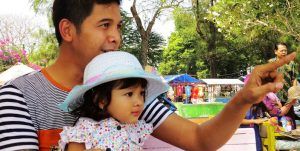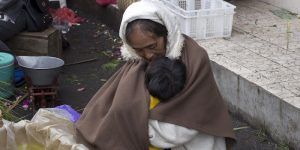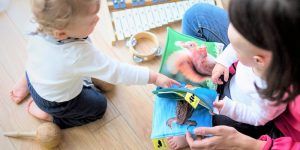

Many of us are familiar with the notorious Bobo Doll experiment by Bandura, Ross, and Ross (1961), but what does it have to do with social work and education?
As it turns out, a lot.
Social learning is a natural approach to acquiring new information relevant to all students and clients and, most of the time, a preferred method of learning.
Social learning presents an alternative avenue for obtaining new knowledge and frequently reinforces social work and education concepts. This type of learning involves observing others and requires four elements:
Let’s explore this applicable theory further.
Before you continue, we thought you might like to download our three Positive Psychology Exercises for free. These science-based exercises explore fundamental aspects of positive psychology, including strengths, values, and self-compassion, and will give you the tools to enhance the wellbeing of your clients, students, or employees.
Our personality may encourage or limit our capacity for social learning.
A shy individual or someone who has introverted qualities may experience fewer opportunities for social learning than someone who is outgoing and frequently seeks social situations.
Additionally, personality can be molded through the environment via social learning. Curran, Hill, Madigan, and Stornaes (2020) studied perfectionism in adolescents and found that social learning and parent socialization predicted the occurrence of the potentially harmful trait.
With social learning, children also pick up academic, athletic, and artistic skills via society, gender groups, peer groups, and their families (Social Work License Map, 2021).

The foundation of social learning theory posits that people learn by observing.
This new knowledge could include both positive and negative behaviors.
For social work practitioners, this theory can apply to behavioral issues or conflict. Social learning theory can be used to both learn and unlearn certain behaviors. Suppose that an abusive parent raises a child. The child may resort to physical violence in their own household when they are older.
Further, social learning theory can explain other deviant behavior. For example, a drug habit could be rationalized and attributed to copying friends’ habits, being influenced by others, or simply being surrounded by the “wrong” people (Kolodziej, 2015).
The importance of surrounding yourself with people whose qualities you wish to emulate cannot be emphasized enough.
The differential association theory, one of the most discussed theories of deviance, was developed by Edwin Sutherland (2015).
Similar to the social learning theory, the premise of this theory is that individuals learn the values, attitudes, techniques, and motives for criminal behavior through interaction with others. This is an example of observational learning, but in the most unfavorable way.
Sutherland (2015) asserted that associations with criminal behavior and a lack of association with noncriminal behavior encourage deviant behavior in an individual.
Interestingly, these researchers provide a logical analogy of a Southerner in the United States who does not pronounce the “r” sound when they speak. Because people in the southern United States may not pronounce “r” sounds, other Southerners are inclined to do the same.
As a social worker, it is helpful to understand this theory, as it may sometimes explain the origin and intent of criminal behavior.
According to Frey, Frank, and McCabe (2021), there is very little research concerning learning from social outcomes in depression or social learning in depression; however, research by Frey and McCabe (2020) suggests that depression is affiliated with learning deficits.
Not only do people with depression experience impaired learning from social outcomes at the neural and behavioral levels, they often have decreased occasions for social interactions, limiting their opportunities for social learning.
Just as personality affects and is affected by social learning, depression has the same relatedness. People with depression may have a difficult time participating socially and gaining new knowledge from social learning.
Promoting positive and healthy habits is a critical part of an educator’s or social worker’s position.
Parcel et al. (1987) concluded that health instruction alone is ineffective in schools’ health promotion. The health instruction needs to be supported by the school environment. Therefore, expected behavior was modeled in classroom activities, such as in stories and role-play.
Students practiced the behavior in the school cafeteria, in simulated situations, or at home, and self-monitored for feedback on current practices and behavior change. Surrounding ourselves with individuals who practice healthy habits can also encourage us to exercise good habits.

Enhance wellbeing with these free, science-based exercises that draw on the latest insights from positive psychology.
Download PDF
By filling out your name and email address below.
Below is a selection of interventions and treatments where social learning theory has been applied.
Cognitive therapy is a powerful tool to elicit behavioral change. Cognitive restructuring aims to achieve schematic change through structured, goal-directed, and collaborative intervention strategies (Clark, 2013; Gardner, n.d.).
With collaborative being the keyword, individuals cannot do this work in isolation. Through therapy, clients identify maladaptive thoughts, and with cognitive restructuring, professionals expose individuals to information that contradicts their biased beliefs (Ellis, 2008).
Skill building targets and builds upon skill deficits. This type of intervention addresses skill gaps and may include social skills training (including life skills training), social cognitive training, cognitive remediation, and Cognitive-Behavioral Therapy (Lyman et al., 2014).
The process involves modeling, behavior rehearsal or role-play, feedback, and reinforcement (Gardner, n.d.). Behavioral interventions in adaptive skill building, particularly early intensive behavioral intervention, are the most effective for children (Palmen, Didden, & Lang, 2012).
Culture restructuring involves a process of creating a positive culture in which prosocial behaviors are positively reinforced (Gardner, n.d.).
Cultures may include the family unit or school setting. In culture restructuring, there is a change in the messages exchanged within the culture, which is accomplished by persuading people to change how they think. Said another way, it is a paradigm shift.
Similar to cognitive restructuring, the operations are much the same in process comparison (Gardner, n.d.). A common six-step process to teach social skills includes (Gardner, n.d.; McDaniel, Bruhn, & Troughton, 2017):
Humans strive to understand and make sense of their environment through comparison. Consider the structure mapping theory. Comparison involves structured representation, a preference for connected relational structure, and mapping to find a semantic similarity between the relations of the domains (Markman & Gentner, 2000). Comparison can occur between processes or standards.
If you want to lead a healthier lifestyle, surround yourself with like-minded individuals who share the same goals. Developing a network of people who strive for a healthier lifestyle and have the motivation to make health-conscious decisions can encourage us to be healthier and maintain the lifestyle changes necessary to improve our health.
Considering addiction treatment, a healthier network of peers may involve a social circle of people who abstain from drugs (MentalHelp.net, n.d.). Someone who has a goal to lose weight may want to seek peers with healthy eating and exercise habits.

The Positive Psychology Toolkit© is a groundbreaking practitioner resource containing over 500 science-based exercises, activities, interventions, questionnaires, and assessments created by experts using the latest positive psychology research.
Updated monthly. 100% Science-based.
“The best positive psychology resource out there!”
— Emiliya Zhivotovskaya, Flourishing Center CEO
Positive coping skills are adaptive and constructive ways to deal with stressful situations (Kaplánová, 2020). Observing positive coping skills and surrounding yourself with people who practice positive coping skills can also help you choose to exercise these skills (MentalHelp.net, n.d.).
Positive coping skills may include mindfulness, meditation, yoga, and deep/slow breathing. Your Life, Your Voice from Boys Town provides 99 Coping Skills and is an excellent tool to find the right coping skill for you. Our own Coping Skills Worksheets for Adults and Youth article is also a top-notch resource to explore coping skills.
Although establishing a healthier network is strongly encouraged, some people may have difficulty distancing themselves from peers who may present a negative influence (MentalHelp.net, n.d.).
In this situation, refusal skills are critical. A deficit in refusal skills could result in harmful behavior, including drug, tobacco, or alcohol use (Anuar, 2018). When you cannot avoid a particular situation or influential peer, refusal skills may consist of verbally declining, redirecting, or physically walking away.

Social learning in education is conducive to instructing numerous students in one classroom, as this learning can occur at multiple levels and through various situations.
Children are constantly observing others, making this type of learning both reciprocal and continuous.
Teachers can support students’ learning by framing personal experiences as meaningful content, facilitating community through peer assessment, using group work to develop shared practices, and extending the purpose of subject teaching to influence students’ identities (Restad, 2021).
Teachers can use the following methods in the classroom to help facilitate learning: